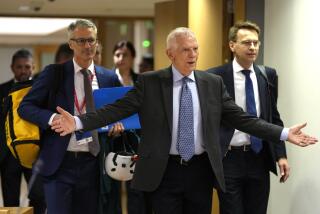IMF Gets Tougher in Lending to Russia
- Share via
MOSCOW — After more than seven years and $19 billion, the International Monetary Fund appears to have finally learned some lessons about Russia.
The terms of a new Russian loan deal announced this week appear to be stricter than anything that has come previously and--perhaps most important--do not include cash payments.
Instead, the deal is in effect a debt rescheduling, and Russia will have to pay back the new $3.1-billion loan plus at least an additional $700 million in the next 12 months.
“IMF officials have been working in Russia since 1991. They have been deceived in the past, and they don’t want to be deceived again,” said Boris G. Fedorov, an economist and Russia’s former tax chief. “They have learned their lesson.”
Russia owes the IMF $3.8 billion this year. The new loan will come to about $3.1 billion over the next 12 months--far from enough to pay back this year’s obligation to the fund.
In effect, then, the IMF will simply transfer the $3.1 billion from one pocket to another. But the agency won’t do even that until Russia fulfills a string of requirements, which include approving unpopular legislation on things such as bankruptcy and banking reform and providing an account of how previous IMF funds were used.
“The IMF people know what is going on here, and they won’t give us any money until they are convinced that all the demands have been truly implemented,” said analyst Irina Yasina, a former spokeswoman for the Central Bank.
After years of focusing on the government’s balance books, the fund appears to be taking a broader approach, using its leverage to force systemic changes.
“The problem isn’t that the government spends too much money,” said Edwin Dolan, president of Moscow-based American Institute of Business and Economics. “Spending has come down. They are cutting lots of corners. You can’t ask them to cut any more out of their expenses on teachers, hospitals and pensioners.”
Indeed, Yasina has estimated that over the last year, pensions have fallen to half their value in real terms, from 130% of the poverty level for pensioners to just 65% in March.
What Russia really needs, Dolan said, is to create a bankruptcy system in which assets can’t be transferred out of bankrupt companies, in which banks can’t gamble away their assets, in which stockholders know that their stock certificates mean something. Those are some of the areas to be addressed by the latest IMF provisions.
Said Charles Blitzer, a London-based analyst for Donaldson Lufkin & Jenrette, “The deep problems are: Why do the biggest and most powerful not pay taxes and leave their export earnings overseas? Why are pensions declining under a left-wing government? The answers to these questions still elude Moscow.”
In many ways, the IMF had no choice but to make Russia another loan. The alternative was to let Russia go into default--and thus receive no repayment and also alienate a still-powerful country with a nuclear arsenal.
The outside world tends to give the IMF the lead in solving economic crises such as Russia’s. But, in fact, the IMF loans are actually a small part of the country’s financial problems.
Although Russia is current on its payments to the IMF, it is in default on much of its commercial and bank debt. Estimates of that figure range from about $100 billion to as high as $170 billion.
“The only creditor whose exposure is going down this year is the IMF,” Blitzer said. “In effect, it’s the private sector that is lending Russia money this year.”
Sergei L. Loiko of The Times’ Moscow bureau contributed to this report.
More to Read
Sign up for Essential California
The most important California stories and recommendations in your inbox every morning.
You may occasionally receive promotional content from the Los Angeles Times.













